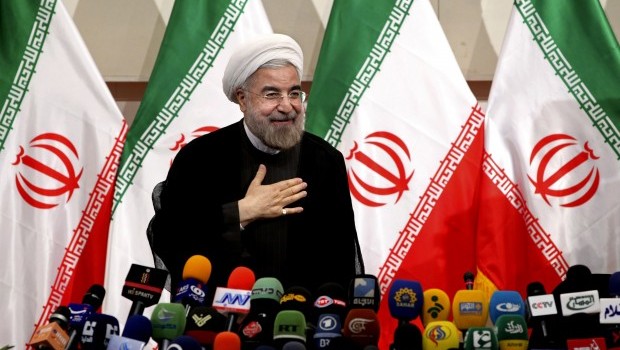
In this Monday, June 17, 2013 file photo, Iranian president-elect Hassan Rouhani places his hand on his heart as a sign of respect after speaking at a news conference in Tehran, Iran. (AP Photo/Ebrahim Noroozi, File)
London, Asharq Al-Awsat—Iranian president-elect Hassan Rouhani may introduce his cabinet on August 4, the same day as his inauguration.
With less than two weeks until Hassan Rouhani takes the oath of office in front of MPs, speculation continues to surround his prospective cabinet.
Rouhani’s election victory was built on a coalition between reformists and moderate conservatives who were marginalized during the eight years of outgoing president Mahmoud Ahmadinejad’s rule.
Both former presidents Ali Akbar Hashemi Rafsanjani and Seyyed Muhammad Khatami supported Rouhani’s campaign, and are now indirectly involved in lobbying for the makeup of the next government.
According to Iranian law, the president can introduce his cabinet to parliament for confirmation up to two weeks following his inauguration.
MP Seyed Sharif Housseini predicted that “it is quite possible for the entire cabinet to be introduced to parliament on the same day as the inauguration”, according to the Iranian Republic News Agency (IRNA).
An unnamed advisor to President-elect Rouhani also mentioned this possibility, according to a report on the news website Tasnim.
Iran’s parliament has canceled the routine legislative program for the week beginning August 3, a move that appears to be in line with the sudden introduction of a new cabinet for a vote of confidence.
As for the makeup of the next cabinet, a number of shortlists have been reported, but there has been no official confirmation of any prospective ministers.
Rouhani is under immense pressure from his reformist supporters to select a strong team in line with his election pledges. At the same time, the hardline faction has made a number of stark warnings regarding the appointment of reformists as ministers, in particular to key portfolios including foreign affairs, culture and Islamic guidance, intelligence, the interior and higher education.
It is predicted that the majority of ministers will be technocrats with proven track records in their given fields. Despite this, Rouhani’s ability to choose his preferred candidates remains unknown.
Traditionally the heads of the three major ministries—foreign affairs, defense and intelligence—are chosen in consultation with the supreme leader.
In a new development, the Sunni imam of Zahedan, Molavi Abdol Hamid, claimed that Rouhani intends to appoint ministers from religious and ethnic minorities in his cabinet, according to the Bahar daily newspaper published in Tehran.
If this were to happen, it would be the first time in the history of the Islamic Republic of Iran that a Sunni has been appointed to a ministerial position.
The Iranian cabinet is made of ministers introduced by the president and voted on by parliament. However, political appointees do not require a confidence vote and can be appointed by executive order. It remains to be seen whether Rouhani will use executive privilege to appoint members of religious and ethnic minorities at sub-ministerial positions.
